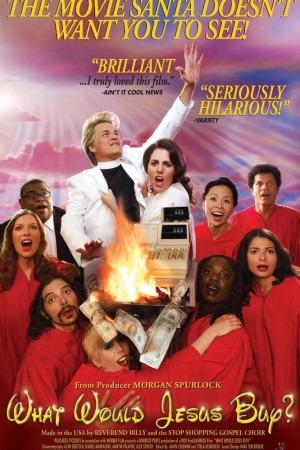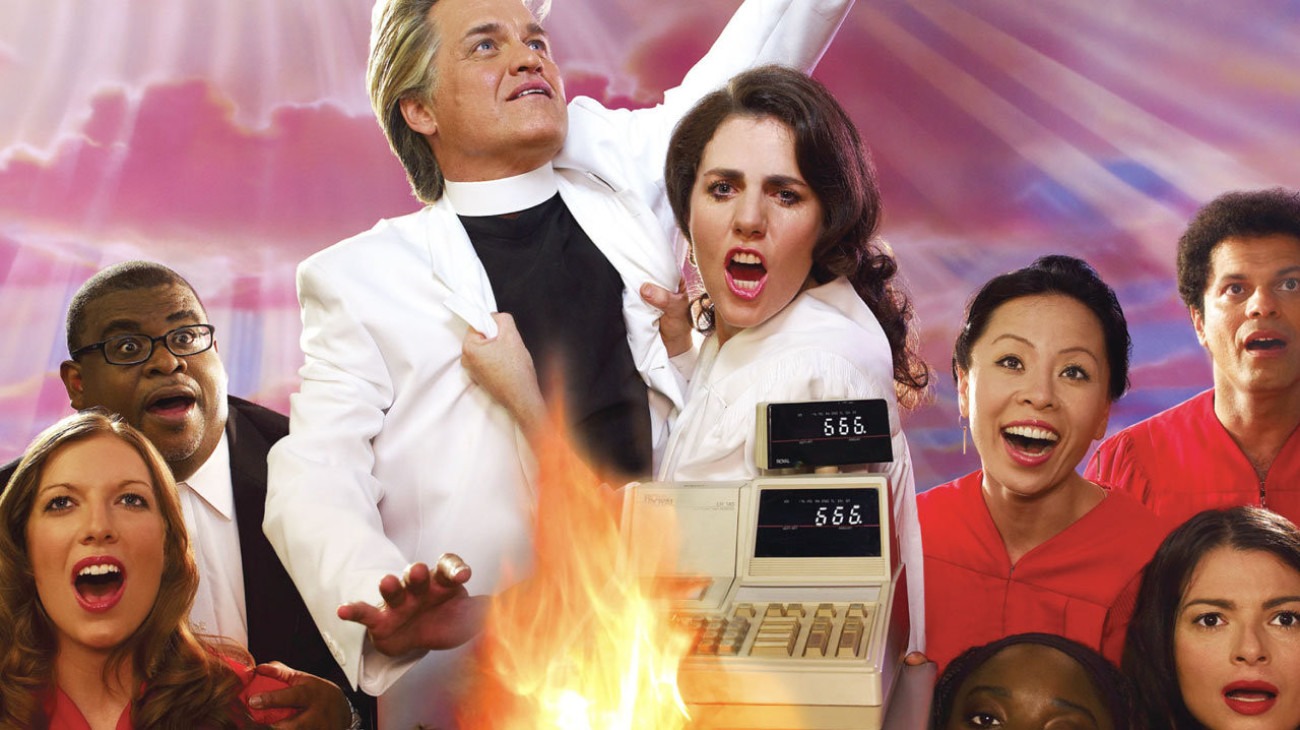
No denying times is hard
He certainly didn't invent the form, but Michael Moore's Bowling for Columbine did more than any other film I can name to popularise the growth of a new type of documentary that doesn't "document" so much as it "argues" - cinematic essays, you might say if you're nice, position papers on film if you're not so nice.
As a genre, they're rather awfully artless, sacrificing form altogether in the name of content and generally coming across as something that would have been just as effective on an op-ed page as it is in your local theater; but every now and then you come across one that manages to be more than just talking heads and ideology. Such a film, I'd contend, is What Would Jesus Buy?, produced under the watchful eye of Super Size Me's Morgan Spurlock, directed by the newcomer Rob VanAlkemade, and owing its modest but undeniable success to neither of those men, but rather the incandescent figure at the film's center, Reverend Billy of the Church of Stop Shopping, AKA Bill Talen, a one-time actor and current culture activist.
Reverend Billy is, as they say, a man with a mission, although typically they don't mean that so literally as is the case here. Since creating the character in 1999, he has made it his life's work to raise Americans' awareness of the dark spectre of consumer debt and shopping addiction, using the (too) familiar model of revivalist church services to couch his arguments. So we have such deliberately overblown spectacles as wallet exorcisms and speaking in tongues in the presence of credit cards.
Though the Reverend's ministry is usually limited in scope to just Southern California, in 2006 he hit upon the idea of a cross-country tour, visting cities both major and minor in the month before Christmas, doing what he could to remind people that the season isn't about giving expensive presents but about giving presents with love. The tour would be filmed, as a means of hopefully getting the word out beyond the limited church audiences who would see it naturally.
That's where we come in, for What Would Jesus Buy? is of course the film produced during that tour. Which is not the same thing as calling it a documentary of that tour, although it's an easy and tempting mistake to make. The film closely hews to the model of a road movie, following a clear narrative arc that explores Billy's increasing doubt at the efficacy of his work, the setbacks he experiences, and finally the catharsis he receives at the end. But Reverend Billy is not the subject of the movie, but merely the star, giving voice to moral arguments in favor of lowered consumption and shopping at local retailers.
I hesitate to call that a "problem," although it's clearly not a merit. As cinema, What Would Jesus Buy? is primitive, much more so than Moore's or Spurlock's films, moving from city to city with plodding determination and using each stop as a convenient point for one particular theme: Chicago is about credit cards, Bentonville, AK (the home of Wal-Mart) is about big-box stores, and so forth. It's a clear and functional structure that isn't even a little bit interesting. Even the few moments where significant plot happens (an arrest here, a car accident there), the cameras very obligingly turn off and so we miss most the fireworks and see only the aftermath.
Even so, the film is easy to watch for its dynamic central figure. A mouthpiece he may be, but Reverend Billy is a great mouthpiece. He clearly enjoys what he does, and throws himself into his sermons with passion and energy. Now, I have no particular love for the excesses of capitalism, so in my case this is preaching to the choir* and my opinion shouldn't be taken for more than it's worth. But I enjoyed watching Billy very much, and found his arguments to gain much from his presence.
That doesn't change the fact that it's artistically inert, but it does mean that it's a fun watch anyway, as well as informative and persuasive, at least a bit (as in all cases where politics are involved, how informative and persuasive is going to reflect upon the individual viewer). It's not much of a film, but it's a swell opinion column.
7/10
As a genre, they're rather awfully artless, sacrificing form altogether in the name of content and generally coming across as something that would have been just as effective on an op-ed page as it is in your local theater; but every now and then you come across one that manages to be more than just talking heads and ideology. Such a film, I'd contend, is What Would Jesus Buy?, produced under the watchful eye of Super Size Me's Morgan Spurlock, directed by the newcomer Rob VanAlkemade, and owing its modest but undeniable success to neither of those men, but rather the incandescent figure at the film's center, Reverend Billy of the Church of Stop Shopping, AKA Bill Talen, a one-time actor and current culture activist.
Reverend Billy is, as they say, a man with a mission, although typically they don't mean that so literally as is the case here. Since creating the character in 1999, he has made it his life's work to raise Americans' awareness of the dark spectre of consumer debt and shopping addiction, using the (too) familiar model of revivalist church services to couch his arguments. So we have such deliberately overblown spectacles as wallet exorcisms and speaking in tongues in the presence of credit cards.
Though the Reverend's ministry is usually limited in scope to just Southern California, in 2006 he hit upon the idea of a cross-country tour, visting cities both major and minor in the month before Christmas, doing what he could to remind people that the season isn't about giving expensive presents but about giving presents with love. The tour would be filmed, as a means of hopefully getting the word out beyond the limited church audiences who would see it naturally.
That's where we come in, for What Would Jesus Buy? is of course the film produced during that tour. Which is not the same thing as calling it a documentary of that tour, although it's an easy and tempting mistake to make. The film closely hews to the model of a road movie, following a clear narrative arc that explores Billy's increasing doubt at the efficacy of his work, the setbacks he experiences, and finally the catharsis he receives at the end. But Reverend Billy is not the subject of the movie, but merely the star, giving voice to moral arguments in favor of lowered consumption and shopping at local retailers.
I hesitate to call that a "problem," although it's clearly not a merit. As cinema, What Would Jesus Buy? is primitive, much more so than Moore's or Spurlock's films, moving from city to city with plodding determination and using each stop as a convenient point for one particular theme: Chicago is about credit cards, Bentonville, AK (the home of Wal-Mart) is about big-box stores, and so forth. It's a clear and functional structure that isn't even a little bit interesting. Even the few moments where significant plot happens (an arrest here, a car accident there), the cameras very obligingly turn off and so we miss most the fireworks and see only the aftermath.
Even so, the film is easy to watch for its dynamic central figure. A mouthpiece he may be, but Reverend Billy is a great mouthpiece. He clearly enjoys what he does, and throws himself into his sermons with passion and energy. Now, I have no particular love for the excesses of capitalism, so in my case this is preaching to the choir* and my opinion shouldn't be taken for more than it's worth. But I enjoyed watching Billy very much, and found his arguments to gain much from his presence.
That doesn't change the fact that it's artistically inert, but it does mean that it's a fun watch anyway, as well as informative and persuasive, at least a bit (as in all cases where politics are involved, how informative and persuasive is going to reflect upon the individual viewer). It's not much of a film, but it's a swell opinion column.
7/10






